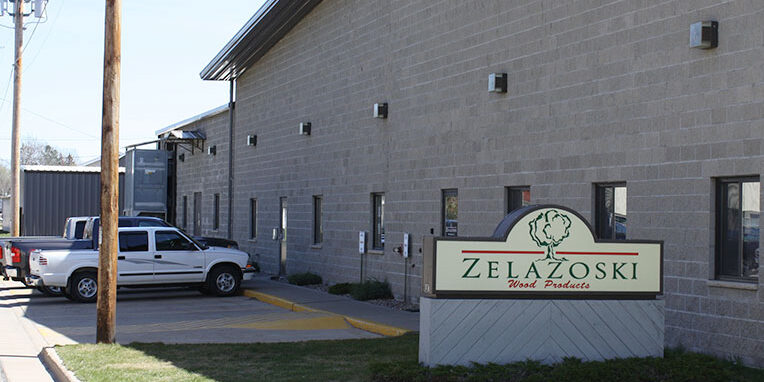Zelazoski Wood Products

Manufacturing custom wood components — everything from baseball bats and fishing lures to brush blocks and mouldings — seems a natural fit for a business situated in the midst of 888 square miles of bountiful forests. And it is. But it is anindustry that has waned in the United States — in fact, Zelazoski Wood Products is one of the few remaining American wood crafters in an era dominated by plastic.
So how has this Langlade County family business managed to thrive for 88 years? By actively seeking opportunities; utilizing their skills and knowledge to build diverse products; and generating word-of-mouth business based on the quality of their work.
Always trying something new.
Zelazoski Wood Products began as Thomas Zelazoski Manufacturing Company in 1924. Tom was out of a job after the homebuilding business he worked for in town burned down. With two children and a mortage weighing on his mind, Tom put his wood crafting skills to work and formed his own company in a vacant blacksmith shop in Antigo, Wisconsin. Tom crafted wooden farm-related items, sold crutches out of the back seat of his car and manufactured cutlery racks for the Westbend Company whose door-to-door salesmen were ubiquitous in the 1950s.
Zelazoski’s continued to evolve with changing consumer trends. In the 1960s, ‘70s and ‘80s, they became a major manufacturer of the popular wooden director’s folding chairs thanks to a business referral from a local lumber supplier. Eventually, the manufacture of those chairs migrated south and Zelazoski’s explored new avenues — racks for spool thread, items for home crafters, musky lures, turkey calls and baseball bats.
How do they discover new avenues? Notes, Ben Zelazoski, one of Tom’s five grandsons who now run the business, “We’re always looking for that new product and we don’t keep all our eggs in one basket. We’re willing to try different things.” Zelazoski’s also works with brokers in Chicago and on the East Coast who explore market opportunities for them, they advertise in trade publications and their reputation serves them well.
Take, for example, the baseball bats. “An entrepreneur decided his next project would be in wood. His trials led him to the University of Wisconsin and Roland Hernandez.” Hernandez is a Research Wood Scientist who provides wood bat design services to Major League Baseball. Together, Roland and the entrepreneur created a maple bat on a home lathe and used Ebay to sell them. “They were snapped right up. They couldn’t keep up with production and contacted us after a lathe machinery salesman recommended us,” notes Ben. Now Zelazoski handles the production and distribution of the maple baseball bats around the globe.
Great location, great global reach.
Forty years ago, Zelazoski’s customers were primarily located in the Midwest — Milwaukee, Chicago and Minneapolis. Now, their wood products have a global audience.
“Langlade County is ideal,” he notes. “We’re connected — highways and an airport. And yet we’re surrounded by forest, lakes and rivers. Clean air, clean water, low cost of living and a friendly atmosphere. The pace is laid back — we get our work done, but then we go out and play and our playground is right out our back door. We don’t slave away all week and then have to drive three hours to get away. We’re here.”
Notes, Ben, “We have a strong manufacturing sector here — plastic, steel, gears, wood – it’s amazing what we manufacture in Langlade County.” And while Ben acknowledges that business will continue to be a challenge as the economy makes a turnaround, he’s optimistic about the trends he sees — especially those in technical education. “The younger generation is starting to see manufacturing as an opportunity. The Northcentral Technical College has opened satellite Centers of Excellence that do a great job. They cost less than a typical college and students graduate with a skill set. The Wood Technology Center in Antigo will graduate its first class this summer.”
He adds, “Where would we be without factory workers? There is great pride in turning out a product. We make a lot of good products here and we need the guys and gals in the blue jeans — they get the job done.”
“It’s been a pretty good life,” is how Ben Zelazoski sums up 40 years of challenges and opportunities in the custom wood manufacturing industry. ““The company has had its ups and downs,” he notes. “But we have a great crew and have always been able to get good people working for us. They’re loyal and we try to treat them well so they will stay with us. They help us earn our reputation – experts with a wide scope of machining capabilities, great breadth of knowledge about wood and capable of creating custom wood manufacturing in a short amount of time.”
